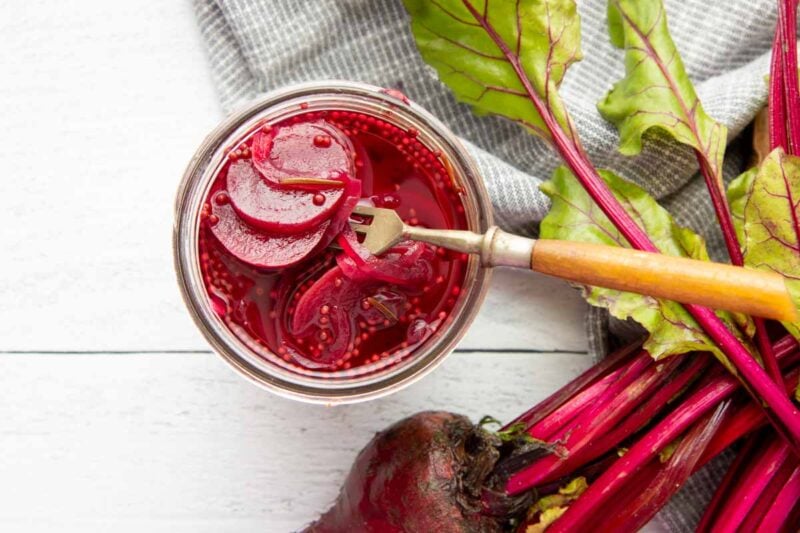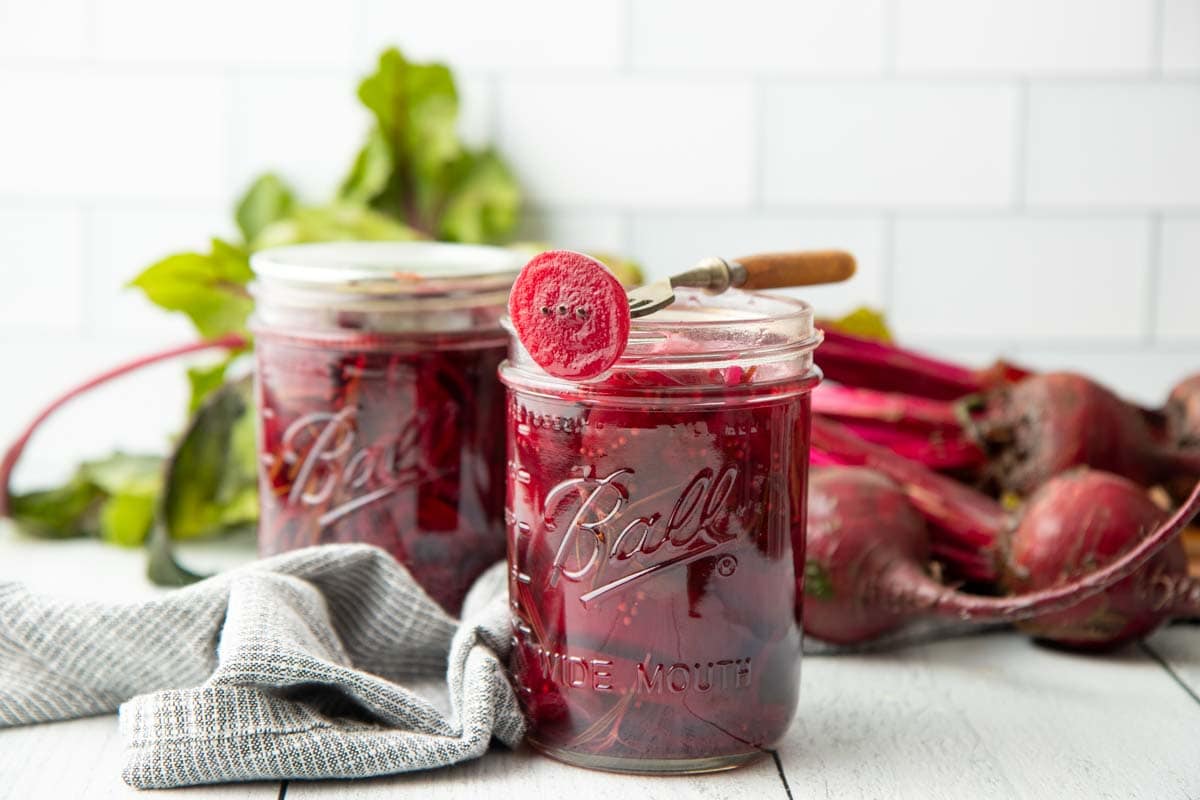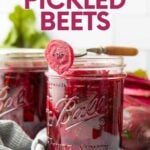This pickled beet recipe is tasty enough to turn even the staunchest of beet-haters into a fan. This heirloom canning recipe has been passed down in my family for generations (and we’ve verified it to make sure it is up to modern canning safety standards), so you can trust that it’s a winner! Plus, pickles are some of the easiest recipes to kick off a canning journey. Let’s get pickling!
How do you get started with canning?
Our Water Bath Canning 101 article has everything you need to know to get started with canning—we promise it’s way easier and more affordable than you think

How do you make pickled beets?
Whether you are making dill pickles or these pickled beets, the pickling process is basically the same. Here’s what you’ll need to do:
- Prep your canner, jars, and lids.
- Prep your beets by washing them well and trimming them.
- Cook the beets until they are just fork-tender. We prefer to boil them, but you can also wrap in them in foil and place them on a baking sheet, and bake or roast them in a 350°F oven.
- Let cool and then peel off the skin. Cut into slices or chunks.
- Prepare the pickling liquid by combining spices, sugar, water, salt, and vinegar in a saucepan. Add in the beets and onion.
- Pack your hot jars by filling with the beets, onion, and pickling liquid. Add in a sprig of rosemary.
- Remove air bubbles and attach lid until fingertip tight. Repeat with remaining jars. Process jars. Check for seal and store.
Protip: Wait before enjoying!
Like all pickle recipes, the flavor should be allowed to develop on the shelf before enjoying. We like to give pickles at least a week, but you’ll get the best flavor after a month or so.
Which beets are best for pickled beets?
Either red beets or golden beets will work for this recipe, but I will say we are partial to the vibrant red you get from using red beets!
Protip: Any size will work!
Smaller beets (1 to 2 inches) will give you the sweetest flavor, but we’ve also found beet pickles to be a good way to use up beets that are too large for fresh eating.

What vinegar should you use for pickled beets?
We recommend Apple Cider Vinegar here. It’s got the right flavor and acidity to make sure your beets taste great and are safe for canning. White vinegar also works from a food safety stand point, but doesn’t have quite the same flavor profile.
How do you make refrigerator pickled beets?
Easy peasy. Just follow the recipe until step #6 (filling the jars) to make quick pickled beets, and then instead of processing the jars so they are shelf-stable, pop them in the fridge. Let them rest for at least 24 hours before enjoying.
How to use pickled beets
Pickled beets are one of our favorite surprise additions to a charcuterie board, but they also work anywhere else you’d use cucumber pickles—alongside a sandwich, on top of a burger, heck even just straight out of the jar for a snack! These beets are also killer on top of a spinach salad with some creamy goat cheese!
Want more easy pickle recipes like this one?
You may also be interested in our Canning Salsa video course!

Pickled Beets
Making homemade pickled beets is a great way to preserve the flavors of fresh beets! Follow our step-by-step guide on how to make canned pickled beets at home.
Adapted from Ball Canning
Ingredients
- 4 pounds beets (about 20-24 medium size beets, 1 to 1 1/2 inch in diameter)
- 3 cups thinly sliced onions (about 3 medium)
- 2 cups sugar
- 3 cinnamon sticks
- 1 tablespoon whole mustard seeds
- 1 teaspoon whole allspice
- 1 teaspoon whole cloves
- 1 teaspoon pickling salt
- 2 1/2 cups apple cider vinegar
- 1 1/2 cups water
- 4 sprigs of fresh rosemary
Instructions
- Prepare canner, jars, and lids for canning.
- Wash beets and trim off the leaves, leaving about 2” of stem.
- Place trimmed beets in a large saucepan and cover with water by at least 1 inch. Bring to a boil over high heat.
- Cook until beets are just tender—about 20-30 minutes depending on the size. Then drain and allow beets to cool. Once beets are cool to the touch, trim off roots and stem, peel, and slice into 1/4” to 1/2” thick slices.
- In a large saucepan, combine the sugar, cinnamon sticks, mustard seeds, allspice, cloves, salt, vinegar, and water. Bring to a boil, then reduce heat and simmer for about 5 minutes. Add in the beets and onion, and cook until the beets are warmed through, about 5 additional minutes. Reduce heat to low, and remove and discard the cinnamon sticks.
- Pack hot beets into the prepared hot jars, leaving a 1/2-inch headspace. Pack a single rosemary sprig into each jar. Then ladle the hot pickling liquid over the beets, also leaving a 1/2 inch headspace.
- Remove air bubbles, clean jar rim, and attach lid until fingertip tight. Repeat with remaining jars.
- Process pint jars in a boiling water bath canner for 30 minutes. Turn off heat, remove cover, and let jars cool in the water for 5 minutes. Then remove jars from the canner, and allow to cool for 12 hours before checking the seal—do not retighten any loose rings. Check for proper seal, then label and store the jars.
Nutrition Information:
Yield: 64 Serving Size: 1 ounceAmount Per Serving: Calories: 44Total Fat: 0gSaturated Fat: 0gTrans Fat: 0gUnsaturated Fat: 0gCholesterol: 0mgSodium: 32mgCarbohydrates: 10gFiber: 1gSugar: 9gProtein: 1g
At Wholefully, we believe that good nutrition is about much more than just the numbers on the nutrition facts panel. Please use the above information as only a small part of what helps you decide what foods are nourishing for you.


